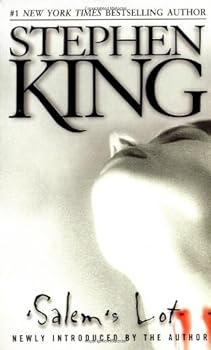Starting in 2012/2013 I started obsessing on Stephen King. I’m slowly working my way through his catalog, which means I should have a pretty full life of King left to me, right? I’m a huge fan of It, The Stand, The Shining, and I actually really enjoyed Under the Dome. I wanted more, and so I’ve gone old school with Salem’s Lot.
I’m over the whole vampire thing, trust me, but I’ve found that King is so much more than monsters and things that go bump in the night. He is at his artistic best when turning the mundane into the profane, or peeling back the layers of what’s public and private, and then igniting even the smallest evil into the flames of hell. His characters are multidimensional; sometimes subtle, other times not. But there’s an innate realism, a quality that makes them relatable. I assumed, and was correct, that these features would make a Stephen King tale of vampires unique, and still fresh.
The basis of all human fears, he thought. A closed door, slightly ajar.
King brings together some regular ol’ New Englanders to star in this early novel of his, written in 1975. Author (what else) Ben Mears returns to his hometown to find the citizens of Jerusalem’s Lot (‘Salem for short) falling under the spell of a new resident, Kurt Barlow. Mears with his brand new gal pal, Susan Norton, pull together a ragtag group to face off against the town’s blood-hungry new arrival,
An old teacher half-cracked with books, a writer obsessed with his childhood nightmares, a little boy who has taken a postgraduate course in vampire lore from the films and modern penny-dreadfuls. And me? Do I really believe? Are paranoid fantasies catching?
King writes efficiently evocative prose that draws imagery directly from one’s own memories:
The witch grass grew wild and tall in the front yard, obscuring the old, frost-heaved flagstones that led to the porch. Chirring crickets sang in it, and he could see grasshoppers jumping in erratic parabolas.
 There’s a certain mood and beauty in the writing that initiates the tension and hold a reader through the entire book. He initiates the tension that only hints at what’s to come.
There’s a certain mood and beauty in the writing that initiates the tension and hold a reader through the entire book. He initiates the tension that only hints at what’s to come.
In this excerpt, King explores a theme also used in The Shining as well as It. Mears describes a theory about the Marsten House, where the suspected vampires now live, and which has a bloody and storied past,
… there may be some truth in that idea that houses absorb the emotions that are spent in them, that they hold a kind of… dry charge. Perhaps the right personality, that of an imaginative boy, for instance, could act as a catalyst on that dry charge, and cause it to produce an active manifestation of… of something. I’m not talking about ghosts, precisely. I’m talking about a kind of psychic television in three dimensions. Perhaps even something alive. A monster, if you like.
In Salem’s Lot, we also find the makings of King’s theme that only children can relate to, and understand, the supernatural, both of a benign and malignant nature. This old theme seems to suck me in with each book:
And you couldn’t explain that to your mother and father, who were creatures of the light. No more than you could explain to them how, at the age of three, the spare blanket at the foot of the crib turned into a collection of snakes that lay staring at you with flat and lidless eyes. No child ever conquers those fears, he thought. If a fear cannot me articulated, it can’t be conquered. And the fears locked in small brains are much too large to pass through the orifice of the mouth. Sooner or later you found someone to walk past all the deserted meetinghouses you had to pass between grinning babyhood and grunting senility. Until tonight. Until tonight when you found out that none of the old fears had been staked – only tucked away in their tiny, child-sized coffins with a wild rose on top.
While not as polished and ‘large’ as It and The Stand, Salem’s Lot is thoroughly enjoyable and completely satisfying.




“While not as polished and ‘large’ as It and The Stand, Salem’s Lot is thoroughly enjoyable and completely satisfying.”
To your point — I think that’s one of the reasons I like this book so much. King was still writing shorter, more concise work in this time period, and every word felt to me like it mattered.
I read this in the 1970s. My husband was still part of the volunteer fire department then and Thursday nights were drill nights. He was gone, and I went to bed to read one more chapter of Salem’s Lot.
(Lots of stories of Stephen King book have this “one more chapter” trope.)
Two hours later when Dave got home I was sitting in the living room with the lights on, because I couldn’t turn them out and go to sleep alone. And of course, I had kept reading!
That was my introduction to Stephen King.